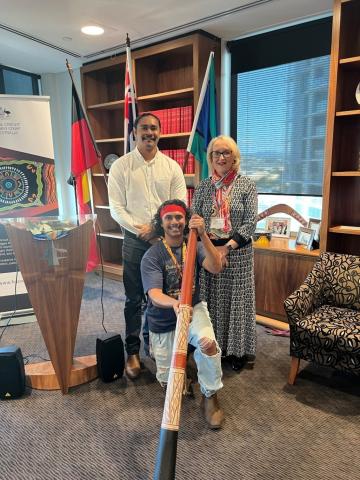Supporting First Nations families through family law courts
The Federal Circuit and Family Court of Australia (FCFCOA) is the largest family law court in Australia. It has taken significant strides toward improving the level of support provided to First Nations families, with a focus on keeping children and families safe.
The Court has delivered key initiatives including the development of the Indigenous Family Liaison Officer (IFLO) role and its expansion to a team of 16 members across Australia. It has also developed a national program of Specialist Indigenous Lists.
The primary role of a liaison officer is to assist First Nations families to understand and engage with court processes, orders and other events. These officers also help those involved in family law disputes to engage with culturally appropriate legal, health and other support services.
The Court has developed Specialist Indigenous Lists to provide tailored, culturally responsive support to Aboriginal and Torres Strait Islander children, and those seeking court orders for care and living arrangements. This may include non-Indigenous parents or caregivers.
This year, the Court also appointed its first Director of National Indigenous Operations, Policy & Support. To recognise the importance of Indigenous-led decision-making and leadership, this role is responsible for the management of Indigenous Family Liaison Officers. The role is integral to the development and implementation of First Nations-related policies and initiatives.

Brisbane-based Indigenous Family Liaison Officer Frank Watson-Brown, her Honour Judge Willis of the FCFCOA (Division 2), Chair of the Courts’ Access to Justice Committee, and local cultural performer Jahmarley Dawson.
Image: Federal Circuit and Family Court of Australia
Working together
Approximately one in every 14 applications for parenting or property orders involve an Aboriginal and Torres Strait Islander party or child.
Consultation with relevant community members and organisations has been crucial. It ensures a national family court system that is accessible to all families, and attuned to the needs of the communities it serves.
The Court has engaged with Aboriginal Controlled Community Organisations (ACCOs), legal organisations (including Aboriginal and Torres Strait Islander Legal Services and Legal Aid bodies), Court users and the Attorney General’s Department.
On 1 August 2024, the Court hosted an inaugural First Nations Forum to hear the collective voices of Aboriginal and Torres Strait Islander peoples.
Over 80 key stakeholders attended the forum, including researchers, advocates, practice experts, community members and representatives from First Nations-led Commissions. Stakeholders from the legal and social services sector, as well as Judges, Registrars, Court Child Experts and Indigenous Family Liaison Officers attended.
The IFLO team regularly engages in community consultation as a key component of its role. Attendance at conferences, roadshows and other events nationally, gives visibility to the IFLO role. This also helps build meaningful relationships with stakeholders from relevant bodies and organisations across the legal profession, ACCOs, and other community members and service providers.
Their work also enables ongoing dialogue between the Court and wider community, which supports early intervention and culturally appropriate referrals in family law matters.
Benefits to the community
The knowledge and insights gained through the work of the liaison officers and feedback from the First Nations Forum has been invaluable in enabling the Court to improve the policies and procedures that directly impact Aboriginal and Torres Strait Islander families.
The FCFCOA is committed to progressing the priority reforms in the National Agreement on Closing the Gap, which focus on changing the way government works with Aboriginal and Torres Strait Islander people.
As part of this commitment, the Court is establishing a First Nations advisory group to facilitate ongoing discussion between the courts, stakeholders and communities nationally.
A comprehensive review and upgrade of the Court’s existing reconciliation action plan is due to be launched in late 2024, to further common goals and aspirations in working towards reconciliation. It will build on the foundations of previous reconciliation action plans by focusing on strengthening relationships with Aboriginal and Torres Strait Islander communities, stakeholders, legal services, and other agencies.
The FCFCOA is also continuing to improve Indigenous data governance practices at all stages of the data lifecycle, to support and promote Indigenous Data Sovereignty.
Find out more
The Council of Australian Governments (n.d.) National Agreement on Closing the Gap, Closing the Gap website, accessed 9 September 2024.



